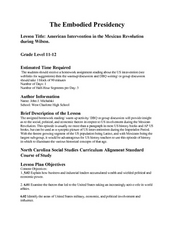College Board
Civic Knowledge and Action in AP U.S. Government and Politics
Vote, it's your civic duty! The high school instructional activity focuses on voter turnout and civic participation with a series of activities. Young scholars analyze data to discover voter turnout trends, complete worksheets, and...
Curated OER
The Embodied Presidency Wilson
Students take a closer look at U.S. intervention in Mexico. In this 20th century history lesson, students examine primary documents to consider why the United States entered the Mexican War and then write DBQ essays on the topic.
Alabama Department of Archives and History
Conflict in Alabama in the 1830s: Native Americans, Settlers, and Government
To better understand the Indian Removal Act of 1830, class members examine primary source documents including letters written by Alabama governors and the Cherokee chiefs. The activity is part of a unit on the expansion of the United...
Curated OER
Constitution Cartoons
Students view series of cartoon overheads that explain Constitution, name branches of government and their powers, define federalism and separation of powers, examine rights and obligations of citizens, and discuss significance of...
Oakwood Publishing
Workshop 4: Constitutional Convention
How do new amendments become part of the US Constitution? AP government students explore, analyze, and use the US Constitution to develop a deep understanding of the interworkings of law and government while practicing synthesis and...
Curated OER
Social Studies: U.S. and China Trade Relations
Twelfth graders assess the status of trade relations between the United States and China. In groups, they give short presentations defending or opposing trade relations with China. After a class vote on the issue, 12th graders write...
Foreign Policy Research Institute
Understanding China: The Prospects for Democracy in China
This document provides useful information for a unit on democracy in China. While it does not include detailed activities, it does have a list of democratic principles, and important facts about China that facilitate understanding of its...
Curated OER
Imposing Democracy
Twelfth graders discuss the probability of imposing a democracy in a country in which there is no history of this type of government being successful. Using the internet, they work together to research Japan's experience with democracy...
Curated OER
Art of Cynicism
Students analyze selected pieces of art and infer how they reflect a sense of disillusionment, and/or cynicism in American society in the aftermath of the Vietnam War and Watergate scandal. Then they identify and place cultural attitudes...
National Endowment for the Humanities
Lesson 1: The United States Confronts Great Britain, 1793–1796
After the Revolutionary War, the success of the United States was far from guaranteed. Foreign powers coveted the new land, and Great Britain challenged American sovereignty. Learners consider the challenges facing the new nation using...
James Madison Memorial Fellowship Foundation
Those "Other Rights:" The Constitution and Slavery
Did the United States Constitution uphold the institution of slavery, or did it help to destroy it? Young historians study Article 4, Section 2, Clause 3 of the Constitution and evaluate the rights of slaveowners as they compared to...
Curated OER
The Japanese Military Build-up
Students evaluate the state of Japan's military and their defense strategy under the current Shinzo Abe administration. They watch the film, 'The Raping of Nanking' and read "The Return of Japanese Militarism: Rising Sun" by Joshua...
Foreign Policy Research Institute
A Geography Lesson
Fewer and fewer people have a strong grasp of world geography, but this activity helps students understand geopolitics by creating their own original historical map. The activity requires selecting a country from the list provided,...
Curated OER
North Korea and Nuclear Weapons Development
Students analyze North Korea's history and their nuclear weapons development. They view a Power Point and work in groups to prepare official United Nations resolutions. After presenting and voting upon the final resolutions, they write a...
Curated OER
Civil Disobedience Action Plan
Students investigate incidences of civil disobedience. In this civil disobedience lesson, students watch a video and read a newspaper article on civil disobedience. Then, in groups, they search a current newspaper for examples of civil...
Curated OER
Political Culture: A Self-Evaluation
Students explore the concept of popular culture. In this popular culture lesson, students take the provided survey on their opinions of political culture and beliefs. Students graph the survey results and discuss them.
Curated OER
FDR Fireside Chat
Eleventh graders examine the purpose of Franklin D. Roosevelt's chats. In this American History instructional activity, 11th graders collaborate with their group members on becoming an expert on a specific chat.
Curated OER
America 2000: Federal Round Table Discussion
Eighth graders examine the United States Constitution and identify the beliefs and values Americans follow today. In groups, they compare and contrast state's rights and federal rights and the issues affecting them. They debate the...
Curated OER
The Philadelphia Convention/Constitutional Convention
Eleventh graders explore the major points covered during the Philadelphia Convention/Constitutional Convention. They discuss the Federalists and the Anti federalists. They discuss the Bill of Rights and the drafting of the Constitution....
Khan Academy
Khan Academy: Legitimacy of the Judicial Branch: Lesson Overview
This lesson overview from Khan Academy discusses the legitimacy of the judicial branch. This lesson is intended for learners taking high school or college level American Government and Civics courses, including the AP Government course.





















